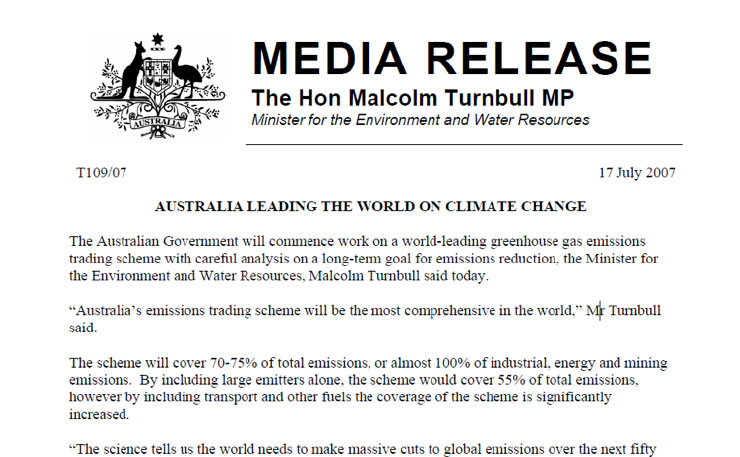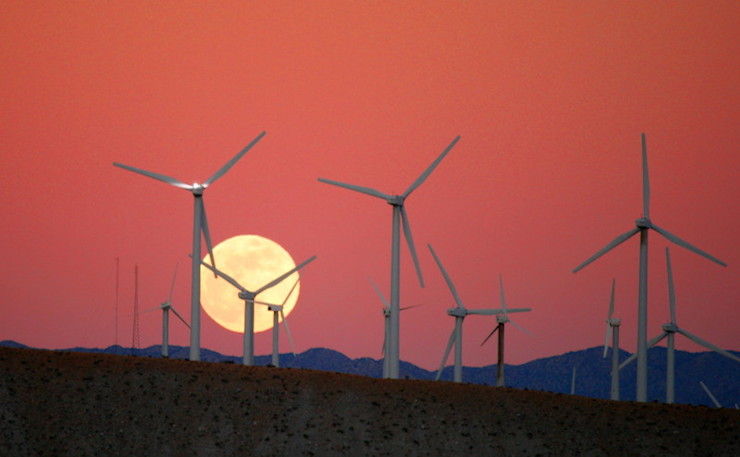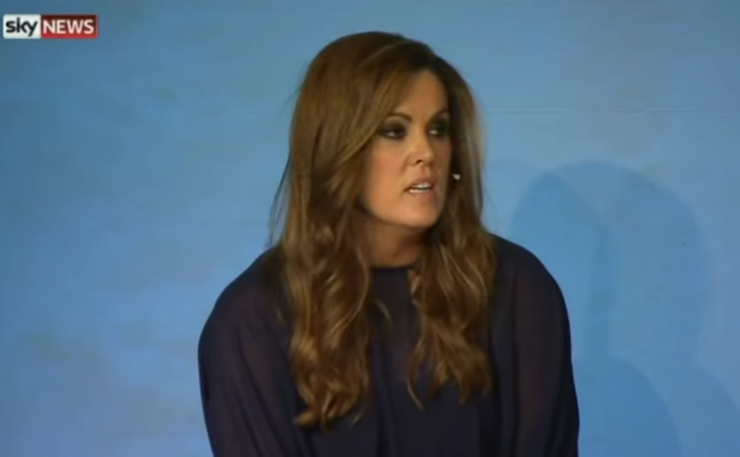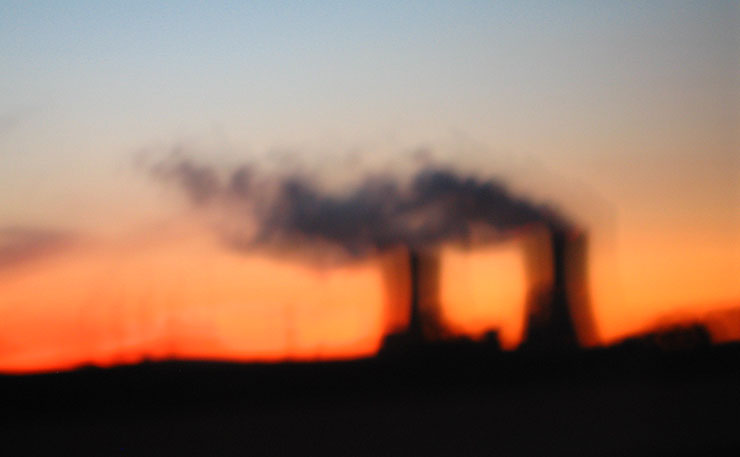Australia has been stuck in a war of politics around energy for more than a decade. Sadly, the architects of those politics – the Liberal Party of Australia – don’t look like running out of steam anytime soon, writes Ben Eltham.
The year was 2007. The long boom felt like it would last forever. Rihanna was topping the charts with her classic ‘Umbrella’. Australia was in the grip of a severe drought. The 11-year old Howard government was behind in the polls, and struggling to gain traction against a Labor Party led by a charismatic fellow named Kevin Rudd.
Polls showed that climate was a major problem for the government. So in July 2007, Prime Minister John Howard announced that the Coalition would introduce an emissions trading scheme, forcing businesses and consumers to pay for the cost of spewing pollution into the atmosphere. The scheme would be up and running by 2011, Howard announced.
“Australia will more than play its part to address climate change but will do it in a practical and balanced way in full knowledge of the economic consequences for our nation,” he said.
Howard’s ETS announcement made emissions trading the bipartisan policy of both Labor and the Coalition. It seemed to mark the beginning of a new era of climate policy in this nation, where there would be broad agreement about the need to reduce carbon emissions, and the necessity of taxing carbon pollution as the way to do it.
The Coalition’s environment minister at the time was an ambitious former barrister and businessman named Malcolm Turnbull. Turnbull was known as a vocal champion of climate action within the Liberal Party.
Turnbull backed a comprehensive emissions trading scheme as the cheapest and best way to address Australia’s growing carbon emissions. “Australia’s emissions trading scheme will be the most comprehensive in the world,” he promised back in 2007. “It will cover 80 per cent of all emissions outside agriculture and about 55 per cent of total emissions in Australia.”
“The science tells us the world needs to make massive cuts to global emissions over the next 50 years,” said Mr Turnbull. “For practical purposes this will mean that by mid-century all or almost all of the world’s electricity will have to come from zero or near-zero emission sources.”

What a difference a decade makes. In the 10 years since John Howard announced the Coalition’s ETS, energy policy has divided and disrupted Australian politics like no other issue. Energy and carbon has made and unmade Australian governments with numbing regularity. Carbon politics helped elect Kevin Rudd in 2007, and helped destroy his prime ministership in 2010. Carbon was instrumental in the implosion of Malcolm Turnbull’s first stint as Liberal Party leader in 2009, and the central compromise he was forced to make to seize the prime ministership off Tony Abbott in 2015.
A decade on from Howard’s announcement, Australia’s energy policy is a smoking ruins. A world-leading carbon policy erected under Julia Gillard has been dismantled, with nothing in its place save for the Coalition’s fantasyland of Direct Action.
Fossil fuel plants are reaching the end of their lives and being retired by their corporate operators, not because they are polluting, but because they are no longer making money. No plans for transition have been put in place, and workers are left high and dry as the dirty old economy shifts beneath their feet.
The national electricity grid is struggling to cope with an unplanned and largely unmanaged transition to renewables, while fossil fuel generators openly game the wholesale electricity market for profit by shutting down their gas and coal plants on high demand days.
Renewable energy is continuing to grow, not because it is good for the environment, but because it is the cheapest form of new electricity generation and energy companies can make a profit from it. In part, this is being assisted by the Renewable Energy Target, but in the main it is a simple function of falling prices, as wind turbines and solar panels get more efficient. Renewables have won, and new fossil fuel plants simply won’t be built.

But while the rise of renewable energy is unstoppable, there is still money to be made by legacy generators. They can do this by manipulating the national electricity grid, for example by temporarily shutting down some of their own generators, which forces the wholesale power price through the roof. Generators are getting away with it because of Australia’s extraordinarily weak energy regulations, which have largely been written for the industry by the industry.
Meanwhile, government ministers are bringing a lump of coal to question time, and cracking vaudeville. It would be amusing, if it wasn’t so pathetic.
It’s hard to think of a bigger public policy failure in Australia in 2017 than energy policy. Australia is the sunniest continent and one of the windiest, and interest rates are at 60-year lows. We have the renewable resources, the know-how and some very cheap money willing and able to invest in a cleaner and greener future.
But we don’t have the political will to do this. In a travesty of partisanship, energy in Australia has been cruelled by a relentless culture war against the very idea of renewable energy, driven by vested interests and aided and abetted by politicians who lie, and a media quite happy to repeat those lies.
The example of the South Australian storm last year is perhaps the most obvious one. As New Matilda reported at the time, and as repeated investigations by both the Australian Energy Market Operator and Chief Scientist Alan Finkel have demonstrated, the South Australian blackout in September 2016 was caused by a cold front with 100 kilometre wind gusts and local tornados. The tornados toppled 275 kilovolt transmission lines, leading to a cascade of faults that eventually took down the South Australian grid.
Was wind power to blame? No. Confusingly, some of the faults on 27 September did involve wind turbines – owing to the overly conservative “ride through” settings on a group of turbines in the state’s north. When the tornados toppled the power lines, causing voltage spikes through the network, nine wind turbines shut themselves off. This tripped the Heywood Interconnector, taking the grid down. AEMO should have known about these ride through settings – but they didn’t. But, quite obviously, the proximal cause of the blackout was the storm.
That didn’t stop Malcolm Turnbull from blaming renewable energy on the afternoon of the blackout – ably assisted by the ABC’s Chris Uhlmann. As a Fairfax Freedom of Information request proved this week, Turnbull knew that the storm had caused the blackouts, not renewable energy. He was told that renewables were not to blame in a special briefing to the Prime Minister’s Office from AEMO. He decided to push on with blaming renewables anyway. Turnbull and his senior ministers lied. Chris Uhlmann, quite obviously briefed from within Turnbull’s office, repeated that lie on national television.
But perhaps we shouldn’t be surprised. The Coalition has a long history of lying about energy policy, as Tony Abbott’s old chief of staff Peta Credlin admitted this week.

Credlin was speaking on Sky News, where she candidly admitted that the Coalition always knew that Julia Gillard’s fixed-price emissions trading scheme was never actually a “carbon tax”, but that the Coalition called it that anyway, in an attempt to damage Julia Gillard. “That was brutal retail politics, and it took Abbott six months to cut through and when he did cut through Gillard was gone,” she explained. Abbott was of course helped by a mainstream media enthusiastically repeating his doom-laden predictions, for instance that Whyalla would be wiped off the map.
Of course, Whyalla was not wiped off the map, and the impact of the dastardly carbon tax was so mild that it was barely noticed by consumers. In a vain attempt to stave off defeat, Labor turned itself inside out on carbon in 2013, when we saw the astonishing spectacle of Kevin Rudd promising to abolish the signature achievement of Labor’s second term, and the key policy preoccupation of his first.
Energy policy in Australia has been derailed time and again by the greed of fossil fuel companies, the irresponsible opportunism of the Coalition, and the weakness and cowardice of the Labor Party.
And so now we’ve reached the point where the Coalition is actively lying about the cause of electricity blackouts, pushing coal plants it knows won’t be built, and blaming things on renewables that it knows they have nothing to do with.
The tragedy of it all is that fondling lumps of coal won’t make the electricity grid function better. It won’t stop coal plants from closing, because they can’t compete against the free energy provided by the sun and the wind. It won’t stop fossil fuel companies gaming the National Electricity Market for windfall gain, at consumers’ expense. It won’t make energy more secure. It won’t save the dying corals of the Great Barrier Reef.
A sane government, a government that puts the interest of the nation above party politics, would concede this, and work to implement policies that would protect the future interests of voters and their children. We don’t have such a government.
We all know why the Coalition is brandishing lumps of coal, and blaming everything it can on the scourge of renewables. It is because of ideology. The Coalition has made so much mileage out of carbon, it doesn’t know how to stop. The Liberal base won’t let it stop, even if it wanted to.
After eight years of treating energy policy as a plaything for political gain, the federal Liberal Party is now so wedded to climate denialism and fossil fuel loyalty signalling that it knows no other way. In the process, Malcolm Turnbull has abandoned nearly everything he once stood for… except perhaps the only real thing he ever stood for, the gaining and holding of power.
After years of taking the low road on energy, the Coalition can’t take the high road any more, even if it tried. Years of feeding the Liberal base lies about climate means many in the Liberal voting base really do believe that the earth is not heating up, that renewables crashed the energy grid, that fossil fuels are still the cheapest form of energy. The Coalition sowed the seeds of climate denial, and now it is left to tend a toxic garden.
To top it all off, Malcolm Turnbull has installed solar panels on the roof of his harbourside mansion in Sydney.
It’s enough to make you weep.
Donate To New Matilda
New Matilda is a small, independent media outlet. We survive through reader contributions, and never losing a lawsuit. If you got something from this article, giving something back helps us to continue speaking truth to power. Every little bit counts.





